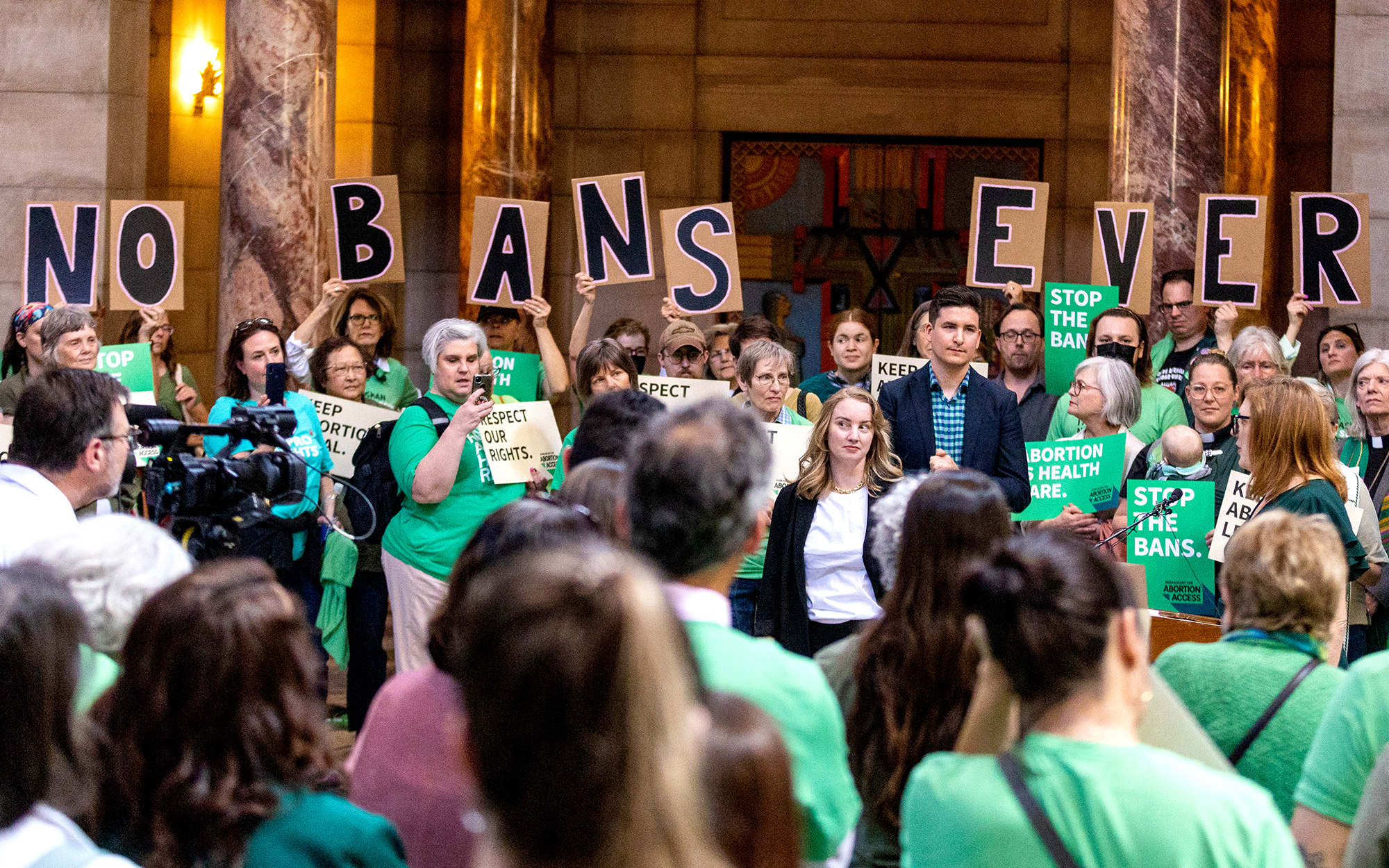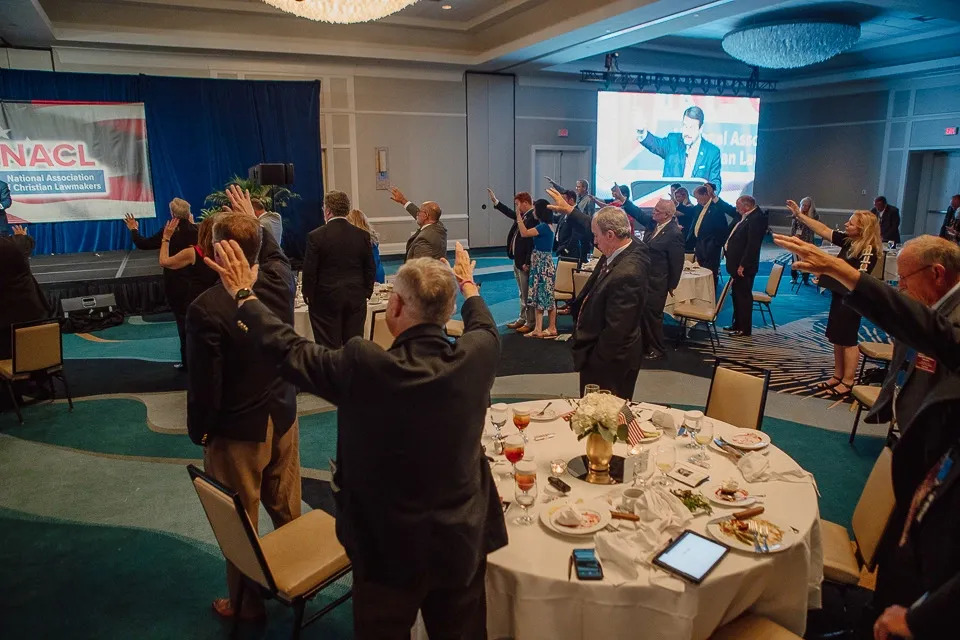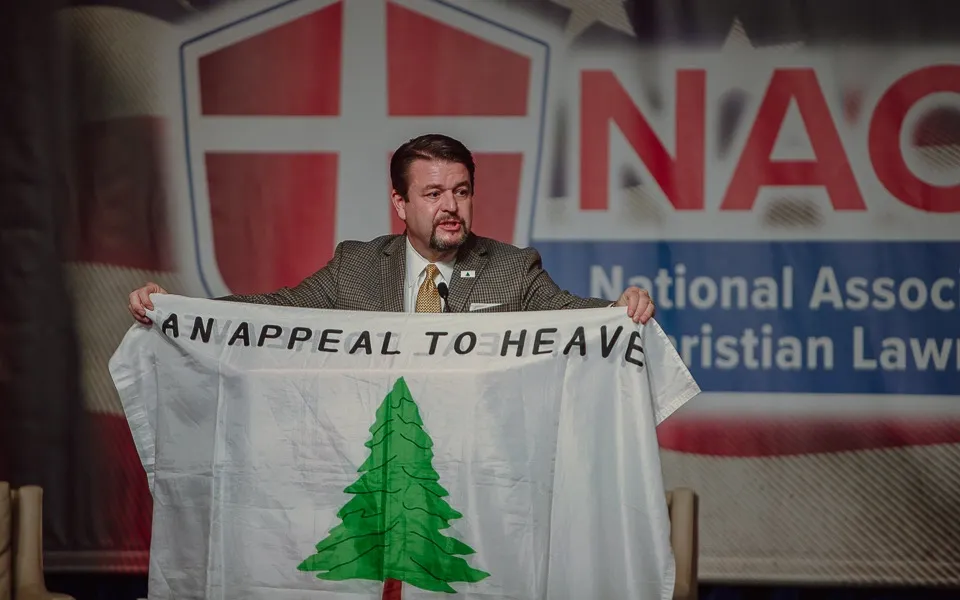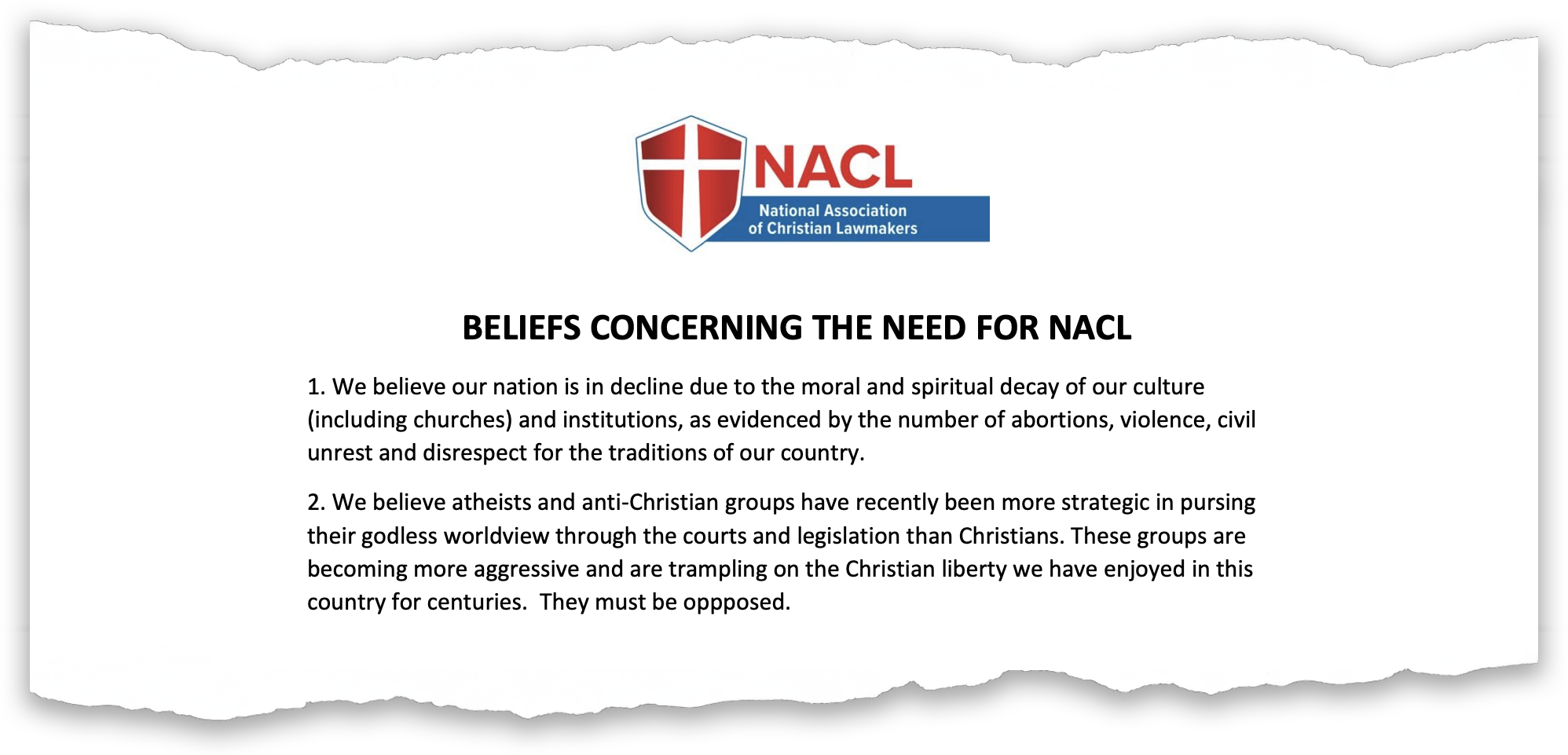
‘Spiritual civil war’: How a group of Christian conservative lawmakers is spearheading a bigger fight post-Roe
A group of Christian lawmakers has been busy reshaping America’s relationship with abortion, LGBTQ issues and religion. But their ultimate goal – bridging the separation between church and state – is far more ambitious.

The National Association of Christian Lawmakers was founded in 2019 and now has members and supporters in all 50 states. The NACL and similar groups are capitalizing on the momentum of the reversal of Roe v. Wade to pursue their vision of more biblically informed policy. (Photo courtesy of National Association of Christian Lawmakers)
Our content is free to use with appropriate credit. See the terms.
LYNCHBURG, Va. – In the harshly lit breakfast bar of a Fairfield Inn, a dozen men and women sit hunched over microwaved eggs and steaming cups of coffee.
The guests are a distinctive group: a collection of legislators and local government officials with one unifying purpose. Among them are an Arizona House member, a North Carolina state senator, a justice of the peace from Arkansas, and state treasurers from Oklahoma and Ohio.
Representing more than half the states in the nation, they have come to southern Virginia to craft policies to take back home: measures to ban abortion, restrict gender-affirming care and condemn gay marriage.
The National Association of Christian Lawmakers has been responsible for at least 15 pieces of model legislation introduced – and in some cases passed – by state legislatures across the country. Its website lists about 60 state chairs and national advisory board members, but the organization claims over 1,000 supporting members and elected officials from all 50 states.
The goal of these lawmakers is to change the social fabric of the country and return America to what they say are its Judeo-Christian origins. One member, Arkansas state Rep. Harlan Breaux, says the best thing that could come from this work is “spreading the gospel all over the country.”
The NACL and similar groups are capitalizing on the momentum Dobbs v. Jackson has given them to create and pass their vision of biblically informed policy.
The Supreme Court’s 2022 decision to end federal protections for abortion was a victory for Christian conservatives nearly 50 years in the making. The fight against social liberalization — and to overturn Roe v. Wade — spawned a political and legal movement that has fueled efforts to inject conservative Christian values into policymaking at every level of government.
The NACL’s work is emblematic of an effective trend in Christian conservative politics after the Dobbs decision: coordinated state-level efforts to undo the conventional understanding of church and state.

Former Arkansas state Sen. Jason Rapert founded the National Association of Christian Lawmakers.He describes the NACL as a place for lawmakers to debate, construct and distribute model legislation from a “biblical worldview.” (Photo courtesy of National Association of Christian Lawmakers)
“We have reached a level of debauchery and immorality that is at biblical proportions.”
— Jason Rapert
NACL founder
A burgeoning powerhouse
The NACL was founded in 2019 by Jason Rapert, a state senator in Arkansas who served from 2011 to this past January. He has made national headlines in past years for pushing for the construction of a Ten Commandments monument at the statehouse in Little Rock, his relentless opposition to gay marriage and gender-affirming care, and a lawsuit filed by atheists after he blocked them on his official Twitter account.
Rapert also is a pastor and runs Holy Ghost Ministries in Conway, Arkansas.
He describes the NACL as a place for lawmakers to debate, construct and distribute model legislation from a “biblical worldview.”
“We believe that with all the troubles facing our country, with Democrats and leftists that are advocating cutting penises off of little boys and breasts off of little girls, we have reached a level of debauchery and immorality that is at biblical proportions,” Rapert said in an interview with News21.
Members of the group sign a pledge voicing their opposition to gay marriage, affirming belief in life at conception, and endorsing the idea that Christianity shaped America and made it what it is today.

The name of the group is very intentional, according to members. The acronym is the same as the chemical shorthand for salt, NaCl, a reference to a passage from the Bible encouraging Christians to be the salt and light of the world.
Although only four years old, the group is well-connected. Funders have given it several hundreds of thousands of dollars in donations, and Rapert has attracted U.S. congressional representatives, prominent anti-abortion and anti-LGBTQ lobbyists, and GOP officials to serve on his board of advisers and to speak at NACL meetings.
Influential Christian conservatives, including former Arkansas Gov. Mike Huckabee, former U.S. Rep. Bob McEwen and Tony Perkins of the Family Research Council, serve on the board. The group also receives funding from such conservative legal powerhouses as the Alliance Defending Freedom, First Liberty Institute, the American Family Association and several other large religious conservative groups.
The organization’s members have introduced legislation at the forefront of politicized cultural issues in states across the country. Those policies are then often circulated as model bills to other members of the group.
In Texas, Rep. Tom Oliverson, who was NACL state chair at the time, sponsored an unsuccessful bill to ensure school books included ratings, while in Florida, Sen. Dennis Baxley sponsored a version of the state’s “Don’t Say Gay” bill. Baxley is a leader on the NACL’s National Legislative Council.
In South Carolina, Rep. John McCravy helped write the state’s six-week abortion ban.
NACL member Bryan Hughes – a Republican state senator in Texas – introduced a revolutionary abortion ban in 2021, allowing private citizens to sue abortion providers and those who help people seeking abortions, which circumvented the then-standing federal protections for abortion under Roe.
The National Association of Christian Lawmakers adopted that bill as model legislation. Seven of 12 similar bills introduced in statehouses across the country and reviewed by News21 were sponsored or co-sponsored by lawmakers who are now group members.
A ‘wall of separation’
Other special interest groups organize meetings for lawmakers and distribute model bills, but for some members of Rapert’s group, the NACL feels unique in its scope.
“For whatever reason, I think that the National Association of Christian Lawmakers focuses more on the social conservative issues than any other entities, other organizations, and so I was happy to join it,” said McCravy, the South Carolina lawmaker.
At the core of McCravy’s beliefs is the idea that Christianity should be at the center of how the United States is governed.
“There’s nothing wrong with being a Christian in office,” he said. “There’s nothing wrong with taking values that are revered and applying them to government. … That was what all our laws are founded on anyway.”
Rapert echoed that view in an interview with News21. “There’s no question in my mind, and there’s no question in an objective mind when you look at history, this truly was a Judeo-Christian nation very intently,” he said.
For Rapert, it’s not just about honoring the country’s roots. It’s about getting Christians elected to all levels of government.
“We need to have men and women that say: We need to take authority so that in our school boards, our city councils, our state legislatures, and in Congress, that we’ve got people that love God and want to do what is right in the sight of God and man,” Rapert said in an interview with the Standing for Freedom Center, an advocacy offshoot of Liberty University, a private Christian institution in Lynchburg.
But those ideas have been contested by people of faith and secular advocates who say specific religious beliefs shouldn’t govern all Americans. They’re also not popular with the broader American public, a majority of whom believe the government should enforce the separation between church and state, according to the Pew Research Center.
“Christians have had a great impact on the law in the history of America, but we’ve never been a Christian nation officially, legally.”
— Holly Hollman
Baptist Joint Committee for Religious Liberty
Holly Hollman, general counsel of the Baptist Joint Committee for Religious Liberty, is one such critic.
“I think the idea that the government is the best to evangelize what we think religiously is a terrible idea,” she said. “Christians have had a great impact on the law in the history of America, but we’ve never been a Christian nation officially, legally.”
Hollman said that making laws shaped by a legislator’s view of Christian values can be harmful for both the government and people of faith because it erodes the separation of church and state.
That phrase was popularized by Thomas Jefferson in an 1802 letter to the Danbury Baptist Association of Connecticut, whose members worried their religious freedoms were being treated as privileges, not rights, by the Calvinist founders of the state.
Jefferson was sympathetic and replied that the establishment clause in the Constitution created a “wall of separation” between religion and government. He added, “the legitimate powers of government reach actions only, and not opinions.”
But for NACL members like McCravy, the separation of church and state doesn’t prohibit established religious beliefs from becoming law.
“It doesn’t say there’s a separation of church and state. There’s nothing in the U.S. Constitution that says that,” he said. “A lot of people think there is, but there’s not.”
Hollman said advancing Christian principles through law isn’t a good way of promoting the values religious conservatives have, as it strips away a boundary between religion and government that is beneficial to both.
“The idea that you would claim that what you need is government advancement of religion to help your faith is just unfounded and, I think, counterproductive,” she said.
That idea, however, is popular among powerful members of the religious right. Liberty Counsel, the Alliance Defending Freedom, First Liberty Institute and other legal advocacy groups have worked for decades, and spent millions of dollars, to advance their views of Christian values in the courts and legislatures.
The belief that the U.S. should be declared a Christian nation, and live under a certain interpretation of Biblical law, has an academic name: Christian nationalism.
“Christian nationalism … is not a religious movement. It’s a political movement. It’s all about power.”
— John Fea
Professor of history at Messiah College
“Christian nationalism … is not a religious movement. It’s a political movement. It’s all about power. It’s all about the belief that you have a corner on the truth and you’re certain about that truth,” said John Fea, a professor of history at Messiah College, a Christian university in Pennsylvania.
NACL founder Rapert has used the phrase on occasion, including at the group’s annual policy conference this past June in Lynchburg.
“If you’re going to call me a Christian nationalist, so be it, baby,” he said in a speech. “I’ll wear that, because we need people that are willing to say, ‘We don’t care what you say, but we’re going to stand up for what is right and we’re going to be those people that will not bow down.’”
That conference was held at Liberty University, founded by the late fundamentalist preacher Jerry Falwell to train, in the school’s words, “champions for Christ.” Falwell founded the Moral Majority movement and was one of the fathers of the modern religious right.
In the last quarter of the 20th century, his work helped build an infrastructure of lobbying groups, funding centers and outreach programs that cemented evangelicals and Christian conservatives as a new voting powerhouse at the center of Republican politics.
For lawmakers intent on ushering their interpretation of the gospel into law, Lynchburg and Liberty University are symbolic.

The National Association of Christian Lawmakers held its annual policy conference in June at Liberty University in Lynchburg, Va. The school was founded by the late fundamentalist preacher Jerry Falwell to train, in the school’s words, “champions for Christ.” (Photo courtesy of Liberty University)
Standing in front of a sign with the words “In God We Trust,” Rapert kicked off a livestreamed portion of the conference with a message to those in attendance.
“Beginning tomorrow, you’re going to be engaging not only in policy discussion, my friends, you’re going to be engaging in spiritual battle,” he said. “You’re part of a true spiritual battle.”
He has used the phrase “spiritual battle” to describe his organization’s role in reshaping America on a number of occasions, including referring to the political landscape in America as a “spiritual civil war.”
The idea of spiritual warfare has roots in many cultures and belief systems, including fundamentalist Christianity. It is based on the idea of a continuous battle between true and false, or good and evil, that spiritual warriors must win.
It’s this type of rhetoric that is becoming more and more common in mainstream politics, according to Matthew Taylor, a Protestant scholar at the Institute for Islamic, Christian and Jewish Studies in Baltimore.
“Broader Republican politics are very hard to separate these days from the agenda of Christian nationalism and Christian supremacy,” Taylor said. “Those ideas have so permeated right-wing politics and right-wing Christian politics in America, that they’re just ubiquitous now.”
‘Serving on the front lines’
This summer’s NACL conference spotlighted a number of high-profile religious conservatives, including Kristan Hawkins, president of Students for Life, which has become one of the most influential voices in the anti-abortion movement since the fall of Roe.
Her organization opposes abortion ban exceptions in the event of rape or incest, as well as certain kinds of birth control like IUDs and emergency contraceptives. The group is also fighting to extend equal protection for fetuses under the 14th Amendment of the Constitution.
“You all are the ones serving on the front lines in some of the most important policy battles of our time,” Hawkins told NACL members. “The political elites and swamp consultants want us to agree that sacrificing innocent lives for the sake of maybe scoring a few political points is best. But you all know the truth. The abortion extremists who dominate the left will hate you, no matter where you draw the line.”

Anti-abortion protesters gather in Washington, D.C., on June 24, 2023 – the first anniversary of the Supreme Court’s decision to reverse Roe v. Wade. The right-leaning court has delivered several rulings of late advancing Christian involvement in public life. (Photo by Trilce Estrada Olvera/News21)
Once the legislative portion of the conference got underway, lawmakers proposed modifications to a number of model bills and resolutions with such titles as “Medical Malpractice and Gender Transition in Minors,” “Unborn Child Protection Act” and “Restoring Marriage Between One Man and One Woman.”
The NACL approved eight new model bills and resolutions at the 2023 conference. They are not posted online, and details on the measures have not been made public. News21 requested copies of the measures from Rapert, but he did not respond.
Rapert said the NACL doesn’t track the effectiveness of its model bills, nor does it know the number of times they’ve been introduced in state legislatures.
Group members who spoke to News21 praised the organization for bringing conservative Christians together to encourage one another.
“You hear good speakers, you get invigorated, you meet other people of like mind that you can collaborate with and network with, and you learn about resources that you did not know about,” said Republican state Sen. Ted Alexander of North Carolina.
“My purpose in coming was to be with like minds to talk policy,” said Arizona Sen. Frank Carroll, a Republican who represents Sun City and other communities just outside of Phoenix. “That’s an opportunity that I always take even if it’s in other areas, but in this particular case, (it’s) because I’m a Christian and because of my worldview about that and the fact that I consider this country a Christian nation.”
‘God has birthed you for this moment’
The NACL’s rise into the mainstream comes at a good time for religious conservatives, as a right-leaning U.S. Supreme Court has delivered ruling after ruling advancing Christian involvement in public life and limiting anti-discrimination laws.
Among the speakers at this year’s conference was Mat Staver, the founder of Liberty Counsel, which litigates religious liberty, anti-abortion and anti-LGBTQ cases across the country. Staver’s organization has argued cases before the Supreme Court that critics say chip away at church-state separation.
In his speech, Staver lauded two cases particularly appealing to religious conservatives: Dobbs v. Jackson and Kennedy v. Bremerton, a case concerning prayer at school.
“I want you to understand the magnitude of the shift that’s just happened,” Staver said.
“Broader Republican politics are very hard to separate these days from the agenda of Christian nationalism and Christian supremacy.”
— Matthew Taylor
Institute for Islamic, Christian and Jewish Studies
In Kennedy v. Bremerton, a high school football coach sued his school district for firing him after he refused to stop publically praying alongside players and onlookers after games. In a 6-3 ruling just days after Dobbs, the Supreme Court decided the district was in the wrong and rolled back government restrictions on public religious displays.
Staver told NACL members that the Dobbs and Kennedy decisions have created an opportunity for religious conservatives to push toward incorporating more Christian views into law, and he encouraged them to take advantage of these new opportunities in state legislatures.
“Never ever, ever get discouraged,” he said, “because God has birthed you for this moment in history.”
Or as Rapert put it in an interview with News21: “It’s time that we stopped letting people hold up Sodom and Gomorrah as a goal to be achieved rather than a sin to be shunned.”
Our content is free to use with appropriate credit. See the terms.






